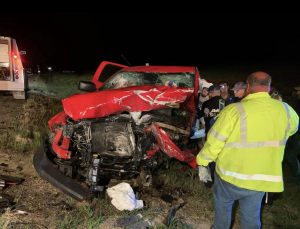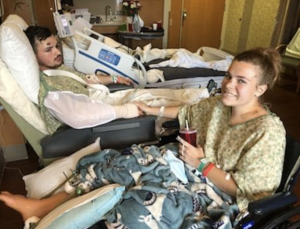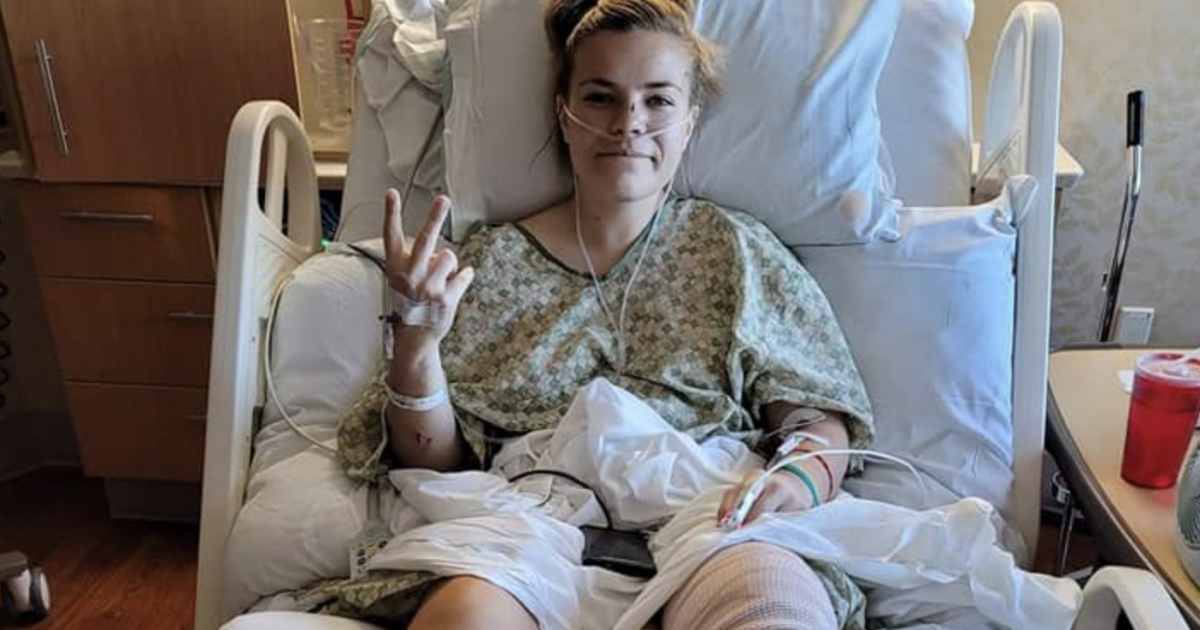An Idaho Woman, 22, Gets A Second And Third Chance At Life
- Lancey Robbins, 22, thought her life was over when a car slammed into the vehicle she was driving after a Memorial Day fishing trip with her then-boyfriend Andrew Leon. Her boyfriend was able to summon help though after the remote crash and she survived after being airlifted to a nearby hospital.
- Once her condition started to improve doctors made the decision to do a biopsy on some concerning lymph nodes that were noticed in her neck. Soon after they informed Robbin that she had stage II non-Hodgkin lymphoma. The cancer diagnosis did not slow Robbins down, and she plans to be in remission by Christmas.
- Dr. Elise Chiong said that sometimes the first sign of lymphoma appears not as a symptom but as a clue on an imaging test ordered for another reason. “I have patients who’ve gotten into car accidents and said, ‘I had a scan of my body and they saw these lymph nodes,’ and that’s how initially the lymphoma was found,” she explained.
Lancey Robbins thought her life was over when a car slammed into the vehicle she was driving after a Memorial Day fishing trip with her then-boyfriend Andrew Leon.
Read More
Car Crash To Cancer Diagnosis
"Honestly, I remember everything," Robbins said in an interview with KTVB.
"I realized they were coming straight towards us. We were just on a straight stretch of road, and there was a curve up ahead, and I remember seeing headlights. They weaved into the opposite lane, our lane. It happened so fast. I had that sinking feeling, there's nothing I can do, they were going to hit us."
Robbins found herself pinned in the driver’s seat next to an unconscious Leon. Once he came to, Leon realized he too was trapped on the passenger side but still able to reach his phone and alert first responders to the accident.
Once at the hospital, Robbins underwent three weeks of surgeries and physical therapy to see if she could walk again.
"My physical therapist had to bribe me sometimes to do physical therapy because it was so painful,” revealed Robbins.
"They bribed me that if I got in my wheelchair, I could go up to Andrew's room and go see him."
It was during one of those trips that Leon proposed to Robbins, telling her: “We're still alive, I still have you, and we get to have a future together.”
After that proposal, things seemed to be on an upswing as Robbins’ condition improved, but then doctors noticed some concerning lymph nodes in her neck.
A biopsy revealed that the doctor had reason to be concerned, and soon Robbins got the bad news which she had to absorb by herself.
"He said, 'I'm sorry to tell you your results came back, and you are positive for non-Hodgkins lymphoma, and you are stage 2,'” recalled Robbins of her diagnosis, which she had to process alone.

Cancer Diagnosis to Cancer Treatment
Robbins began to prepare for the worst and decided that the one thing she wanted to do was marry Leon.
Once in stable condition, but before she started treatment for cancer, she did just that.
Then, she got to work battling non-Hodgkin lymphoma.
"Usually, people get married, and they have the happy honeymoon phase, and then the hard times hit,” said Robbins. "We are just going to get it all out now and enjoy the rest.”
Her cancer diagnosis managed to bring her and Leon closer, though, she said, and he has been by her side through her battle.
It seems to be helping, too, as Robbins is responding well to treatment, and doctors believe that she should be fully recovered from both the crash and have her cancer in remission by Christmas.
Why Sneaky Lymphoma Symptoms Make Cancer Diagnosis Difficult
Lymphoma is a cancer that often creeps in silently, without symptoms. And even when people do have signs, they don’t necessarily point directly to cancer. For example, swollen glands are much more likely to be from an upper respiratory infection than lymphoma.
The sneaky nature of symptoms, coupled with a lack of screening for lymphoma, leads many people to be diagnosed at an advanced stage — 3 or 4. By that point, the cancer may have already spread throughout their body. Yet even at a late stage, the outlook isn’t as dire as many people might assume.
Related: 6 Symptoms of Lymphoma & How to Spot Them
“The one thing that I always reassure people about when they are diagnosed with advanced-stage lymphoma is that, unlike other cancers, where the advanced stage is a death sentence, that’s certainly not the case for lymphoma,” Dr. Elise Chong, medical oncologist at Penn Medicine, told SurvivorNet in a previous interview.
For example, the 5-year relative survival rate for early-stage follicular lymphoma is 96%. Once the disease has spread, the 5-year survival rate is 85% — still good odds.
“We have many treatments with which people can either be cured with advanced-stage lymphoma or have very good remissions,” added Dr. Chong. “So it doesn’t change how treatable someone is, even when they do have advanced-stage lymphoma.”
Spotting the Symptoms
The first lymphoma symptoms can be so subtle that you might not even notice them. It may not be until you visit your doctor for a check-up that you discover there could be a problem.
“People say, ‘But I feel completely fine,’ and that’s very normal,” pointed out Dr. Chong. If a lump is found, often “it’s only because either someone palpated a lymph node and felt some swelling in their neck or in their groin or under their arm.”
Other symptoms include:
- Swollen lymph nodes in your neck, armpits, or groin
- Weight loss
- Tiredness
- Fevers
- Swollen belly
These are all more than likely to be symptoms of something far less severe, but a doctor’s visit may be in order if multiple symptoms coincide.
There are also a group of symptoms doctors refer to as “B symptoms.” Those include fever, night sweats, or weight loss. “If people are having any of these symptoms, it’s really important that they tell their physician early so that doctors can do the proper testing,” noted Dr. Chong.
She went on to say that sometimes the first sign of lymphoma appears not as a symptom but as a clue on an imaging test ordered for another reason. “I have patients who’ve gotten into car accidents and said, ‘I had a scan of my body, and they saw these lymph nodes,’ and that’s how initially the lymphoma was found,” explained Dr. Chong.
Just like Lancey Robbins.
Learn more about SurvivorNet's rigorous medical review process.


